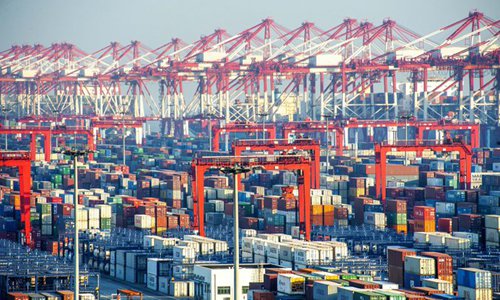HOME >> BUSINESS
Chinese companies shine at Anuga food trade fair
By Xinhua – Global Times Source:Global Times - Xinhua Published: 2019/10/7 19:23:40

Photo: Xinhua
Red peppers, green tea, white mushrooms and yellow canned peaches, brought from more than 7,000 kilometers away, are a feast for the eyes as well as the taste buds.
Around 600 Chinese exhibitors have attended Anuga, the world's largest food and beverages trade fair which started Saturday in Cologne, Germany, scouting opportunities for business and to promote Chinese brands and food culture.
At the China (Zhejiang) Pavilion, local specialties such as green tea, yellow wine and dried mushrooms were displayed in an inviting manner. More than 50 companies from East China's Zhejiang Province jointly presented their agricultural and processed food products.
At a live cooking show performed by a Zhejiang chef, different courses inspired by the local cuisine date back centuries and were enjoyed with great popularity.
Zhejiang Province is a comprehensive agricultural production area known as the "land of fish and rice, home of silk and tea," said Sun Kuifa, an official from the provincial department of agriculture and rural affairs.
The province's export of agricultural products and processed foods ranked fourth in China in 2018, with the European Union a major export destination, Sun said.
In 2003, the province first began to organize local companies to attend Anuga, and has thus taken the trade fair as a leading platform for EU markets and beyond, Sun said.
Denis Steker, vice president of the international cooperation department at Koelnmesse GmbH, attended the opening ceremony of the pavilion. "The worldwide growing interest for the Chinese cuisine and culture provides a favorable climate for the export of food and beverages," Steker said.
Steker said the number of Chinese exhibitors has been growing steadily over the years. "This growth rate shows the rapid development that China's food industry has undergone and constitutes an impressive performance record," he said.
Not far from the culinary show, China State Farm Official Flagship Store attended Anuga for the first time. Oolong tea, soy milk and coffee were poured into small cups for passersby.
Chen Zhongyi, vice director of China State Farm Economic Development Center, said they have selected about 20 signature beverage products from different farms for this year's Anuga.
Attending Anuga is a step to further explore international cooperation and to promote China State Farm as a brand, Chen said.
Many Chinese companies at the trade fair are already veterans in the export business. Li Gang, a senior executive from a honey company based in Northwest China's Ningxia Hui Autonomous Region, said that the company has been coming to Anuga for two decades.
Their organic honey mainly sells to the European market, Li said, adding that he has observed a growing consumer interest for raw and organic food. In a competitive market, their company has to continue to offer products of high quality and varieties, Li said.
Celebrating its 100th anniversary this year, the five-day trade fair has attracted around 7,500 exhibitors from 106 countries and regions. The number of visitors is expected to exceed 165,000, according to the organizers.
The first Anuga took place in Stuttgart, Germany in 1919. Since 1951, the trade fair has been held in Cologne every two years.
Posted in: COMPANIES